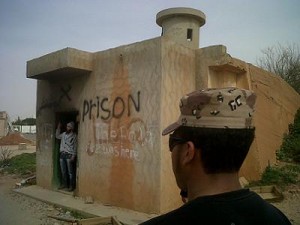Gaddafi’s Secret Killing Fields – OpEd
By Shafiq Morton – Benghazi
Ajdabiya, the eastern town and opposition stronghold, gets bombed during the night. Well, a shell lands in the town. Not much damage, but lots of fear.
Everybody knows there is worse to come.
And that’s just how Gaddafi likes it: raw terror. Here’s a man who has no respect for his people, a man who bombs them from the air with former Soviet Union supplied fighter jets.
With his ego larger than the African continent, one is dealing with a modern-day Pharaoh. Forget about Islam, the Third Universal Theory or the Green Book.
Gaddafi is all about himself. He is his own wrathful god. Gaddafi is god. Traitors are those misguided ones who do not worship at his feet.
Except that this time his bullied subjects no longer fear him. After 42 miserable years, they’re tired of being beaten, tortured, burnt and killed.

His poor, dusty and undeveloped Libya – a country that should be as wealthy and comfortable as any Gulf oil state – is being reduced to ashes.
And as so many Libyans have told me; Gaddafi doesn’t care if he ends up ruling an empty country. He will just carry on killing and killing. He has been doing it for four decades, so why stop now?
The fact that every government building, every security facility, every army barracks and every Gaddafian pleasure palace has been gutted from Tobruk to Tripoli is irrelevant to him.
The fact that the Libyan people have finally risen up, and said NO with a resounding voice, only means to him that they’re disobedient chattels who must be punished.
A doctor who used to be part of Gaddafi’s personal medical staff tells us that the Libyan leader – apart from dabbling in the Jewish kabbalah and the occult – suffers from asthma, hypertension and insomnia.
Another medical man, Dr Zaruh Nabus of Harawi hospital in Benghazi, believes that the Brother Leader is schizophrenic.
“I’ve seen dictators and Gaddafi is not a dictator,” he says, “he’s schizophrenic.”
We see the real measure of Gaddafi when we visit the Katib al-Fadil security compound in the coastal city of Benghazi. It is where many died during the uprising, Gaddafi’s African mercenaries shooting unarmed civilians with anti-aircraft guns.
The injuries and fatalities were horrific. Ack-ack guns fire shells with explosive heads. Dr Nabus’ eyes fill with tears. He says it was heartbreaking having to pick up body parts from the road.
The fall of Katib al-Fadil is a story that will become a Libyan epic.
It’s unlikely hero is Mahdi Zeiw, a mild-mannered oil engineer. Born the year Gaddafi deposed King Idris, Zeiw put two domestic gas cylinders into his car and made a detonator from fishing explosives. He then drove into the gates, blowing them open.
It was a turning point for Benghazi, and Katib al-Fadil fell, with about 200 mercenaries fleeing to the neighboring villages of Maghouri and Algouarsh, where some were captured.
I’m told by more than one source that Zeiw was not an extremist, or fanatic. Libyans, as I’ve learnt, are not that way inclined.
Dr Nabus says it was an accumulation of sadness, anger and frustration boiling up like a volcano that saw him doing what he did.
“He just couldn’t take the children being killed.”
We drive into the compound, its 4 meter walls breached in places. All the buildings, including Gaddafi’s residence, have been gutted. The wrecks of burnt out cars and army vehicles are strewn everywhere.
We are led to a small building, the word “prison” sprayed on its walls. We enter through its ripped off doors and discover a massive chamber.
It’s gloomy inside, and big enough to park a Mac truck. Leading off the main chamber are two rooms. They are dark, and only via the light of a cellphone can we see inside.
I thought at first that I was looking at an ammunition dump. But Seraj Benserti of Benghazi’s 17 February Media Centre, tells me that when they broke into the compound they’d heard knocking and screaming coming from the ground.
“We found 20 live prisoners down here,” he said. This had been no ammunition dump, but a dungeon in which human beings had been locked up in total darkness.
Were those fingernail scratches in the one wall? None of us spent enough time in this hellhole to find out.
Benserti points to a series of craters in the compound. They are where protestors had searched for more chambers.
“We used bulldozers to look for entrances, but we couldn’t find any as the warders had fled,” he said.
He commented that not even those soldiers guarding the outside of Khatib ul-Fadil knew what horrors were being perpetrated behind its walls.
“We smelt rotting bodies but couldn’t locate them,” said Benserti, adding that they had found several corpses, most burnt beyond recognition.
Dr Musbach Abdullah, an anesthetist, shows me a video at the hotel later that evening. In it a man lifts a charred body which disintegrates in his hands.
It’s then that I think of a statement made to me earlier that day by Dr Nabus:
“The difference between the tsunami in Japan and Libya is that Libya’s killing fields can be stopped.”
– Shafiq Morton is a presenter at Voice of the Cape radio station. He was South African Vodacom Community Journalist of the Year in 2008 and was recently voted amongst the world’s 500 most influential Muslims by the Jordanian Royal Islamic Strategies Study Centre headed by Prof John Esposito of Georgetown University. He contributed this article to PalestineChronicle.com.
